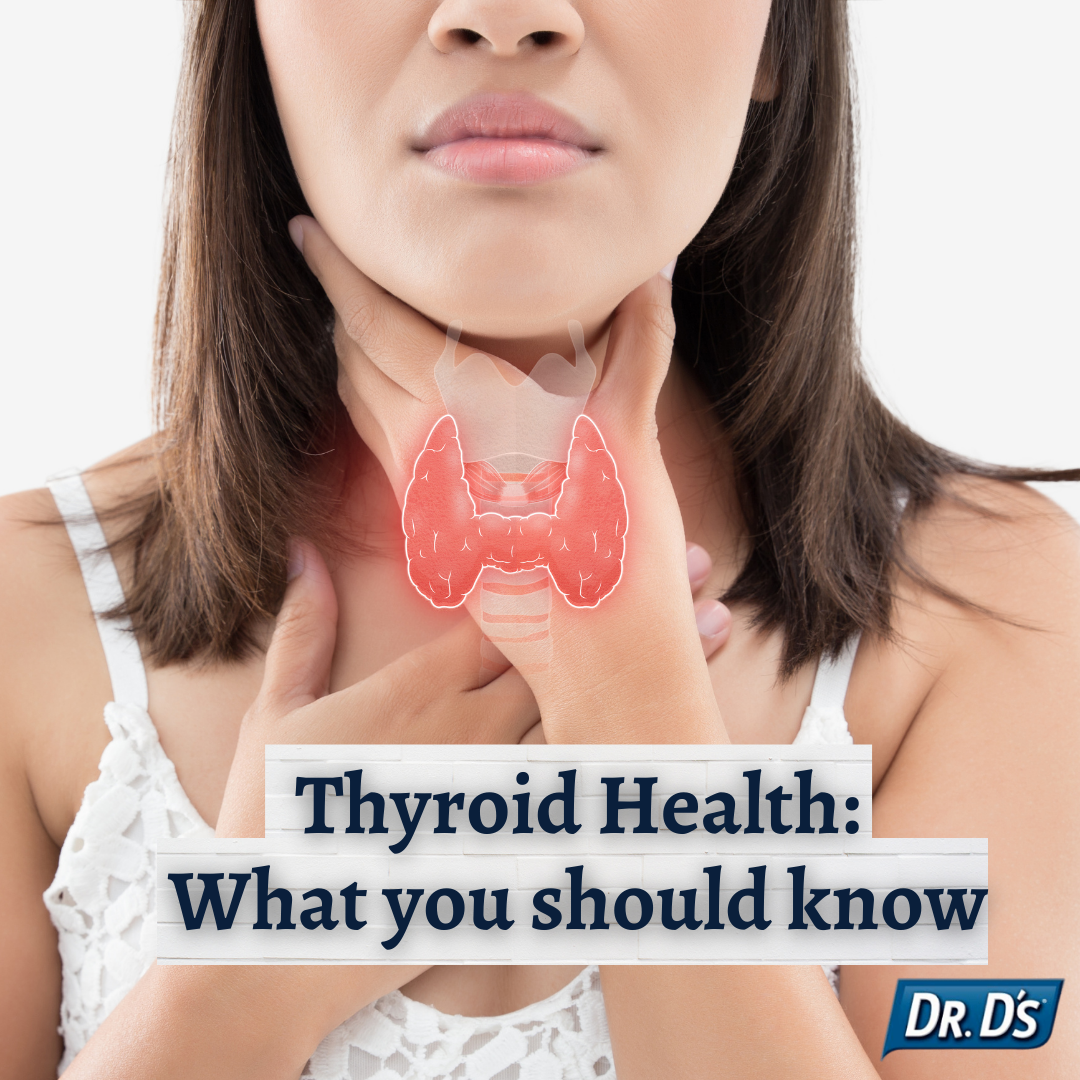
Thyroid Health: What you should know
Share
Thyroid Health: What you should know
June is Thyroid Month in Canada. Thyroid disease is very common but sometimes not picked up in patients right away. As a result, they experience a variety of symptoms without understanding the underlying cause. As always, at Dr. D’s we aim to raise awareness of all types of health concerns in order to hopefully help improve pain, quality of life and prevent disease in as many lives as possible.
So, without further ado, let’s dive into some facts about the thyroid.
What exactly is the thyroid?
The thyroid is a small butterfly-shaped gland at the front of your neck. It is responsible for secreting hormones (called T4 and T3) which are essential to growth, metabolism, development and regulation of regular bodily functions. Iodine is the main constituent within the thyroid hormones. We must obtain iodine in our diet in order to be able to produce these hormones, which is why salt and bread in some parts of the world are fortified with iodine. In contrast, too much iodine can cause problems in those who have an overactive thyroid.
You may have heard about goiters in relation to the thyroid gland. A goiter is actually the enlargement of the thyroid and it may be linked to thyroid disease.
Types of Thyroid Disease:
Because the hormones it produces are so essential, disarray in the production or secretion of the thyroid gland can cause a wide variety of symptoms and conditions. Also, it is important to pick up on it along with your medical doctor and get it treated because uncontrolled thyroid disease can result in serious consequences.
There are 2 main presentations of thyroid disease: Hypothyroidism (an UNDER active thyroid) and Hyperthyroidism (an OVER active thyroid).
Symptoms of Hypothyroidism:
- Slower heart beat
- Decreased appetite, but weight gain despite of it
- Sensitivity to cold
- Constipation
- Dry skin
- Slow mental processing
- Poor memory
- Fatigued/Depression
- Increased size of the thyroid
Symptoms of Hyperthyroidism:
- Rapid heartbeat
- Tremors
- Increased appetite, but weight loss despite of it
- Heat intolerance
- Diarrhea
- Restlessness, anxiety and sleep problems
- Eye changes (including loss of the inner portion of eyebrows)
- Nervousness/irritability
- Increased size of thyroid
It is important to note that the symptoms of thyroid disease in each patient may be different depending on several factors, including the underlying CAUSE of the under- or over- active thyroid gland. A person may or may not have all or even any of the symptoms with thyroid disease; and on the other hand, a person may have many of these symptoms without a thyroid issue. This is precisely why thyroid diseases are difficult to detect and awareness of them must be made.
***You must speak with your medical doctor if you suspect you may have a thyroid condition to make sure it is ruled out or to treat it if you do have one.***
Let’s have a look at the underlying causes of hypo- and hyper- thyroidism.
Causes of Thyroid Disease
Autoimmune Disorders
An autoimmune disease is when the immune system mistakenly attacks normal body tissue, as if it is some sort of threat. These are the most common causes of thyroid illness.
1) Graves’ Disease
With this autoimmune disease, the thyroid gets tricked by something called the Thyroid Stimulating Antibody, which looks similar to the Thyroid Stimulating Hormone (a healthy hormone that is produced by the pituitary gland to signal the thyroid to produce T4 and T3). This results in excessive production of thyroid hormones and therefore, HYPERTHYROIDISM. Graves’ disease is fairly common, affecting 1 in 100. Graves’ disease may undergo times of remission, but it is most of the time a lifelong condition which needs to be continually monitored and treated with medications to suppress the thyroid function within a safe range.
2) Hashimoto’s Disease
Hashimoto’s is even more prevalent than Graves’ Disease. It is the opposite of Graves’ as it actually leads to the destruction of thyroid cells and eventual failure of the thyroid gland, leading to HYPOTHYROIDISM. It is due to a dysfunctional immune response whereby inappropriate antibodies bind to the gland and cause inflammation.
Thyroid Nodules and Thyroid Cancer
A nodule is a growth of abnormal tissue. Nodules of the thyroid are quite commonly cysts which may be benign or malignant (ie. cancerous). This is why they are always investigated/biopsied. The majority of thyroid cancers have a positive prognosis when treated. Once again, it is important to speak with your medical doctor with concerns about thyroid illness.
Turmeric and Autoimmune Disease
A fascinating fact about turmeric is that it can stimulate an immune response when necessary, but it also has been shown to have immunosuppressive effects. Why would we want to suppress an immune response, you ask? Because like so much else in life, too much of a good thing can often lead to bad. There are many diseases that arise when the immune system mistakenly overreacts- this is the basis of autoimmune disease. Other examples of autoimmune disease includes Multiple Sclerosis, Rheumatoid Arthritis and Crohn’s Disease. Essentially, turmeric seems to possess a natural genius; knowing when and how to stimulate the immune system when needed, yet suppressing it when it is being overdriven.
Read more about Dr. D’s Ultra BioTurmeric on our blog entitled Dr. D’s Ultra BioTurmeric: Whole Root Nutrition